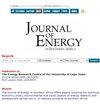Improving reliability of the power distribution system in Goma (DRC) using solar distributed generation
IF 0.6
4区 工程技术
Q4 ENERGY & FUELS
引用次数: 1
Abstract
The existing power distribution system of the city of Goma in the Democratic Republic of the Congo has many problems, including the scarcity of electric energy, power unreliability, the low access rate of electrification, poor flexibility in the network topology, and lack of demand response, which lead to shedding of load, unbalancing and overloading the system. The reliability of the Goma power distribution system is very poor by international standards. The major cause of this is the lack of adequate energy supply to meet demand. To mitigate the power reliability problem, a solar-based distributed generation (DG) is modelled and evaluated in this study. Each feeder has been considered separately with an appropriately designed DG. The work has evaluated initial investment cost and life cycle cost of the investment to assess the feasibility of the proposed solution. Based on the unserved energy and electricity tariff, an economic analysis was conducted. The reliability indices are computed and the modelled solution is designed for each feeder in PV syst software and simulated using ETAP, whose simulation results show that the reliability can be improved by up to 76%.利用太阳能分布式发电提高戈马(刚果民主共和国)配电系统的可靠性
刚果民主共和国戈马市现有的配电系统存在电力能源稀缺、电力不可靠、电气化接通率低、网络拓扑灵活性差、需求响应不足等问题,导致系统脱落、不平衡和过载。按照国际标准,戈马配电系统的可靠性非常差。造成这种情况的主要原因是缺乏足够的能源供应来满足需求。为了缓解电力可靠性问题,本文对太阳能分布式发电系统进行了建模和评估。每个馈线都单独考虑了一个适当设计的DG。该工作评估了初始投资成本和投资的生命周期成本,以评估所建议解决方案的可行性。基于未使用的能源和电价,进行了经济分析。在光伏系统软件中对每个馈线进行了可靠性指标的计算和建模,并利用ETAP进行了仿真,仿真结果表明,可靠性可提高76%。
本文章由计算机程序翻译,如有差异,请以英文原文为准。
求助全文
约1分钟内获得全文
求助全文
来源期刊

Journal of Energy in Southern Africa
ENERGY & FUELS-
CiteScore
3.00
自引率
0.00%
发文量
16
审稿时长
6 months
期刊介绍:
The journal has a regional focus on southern Africa. Manuscripts that are accepted for consideration to publish in the journal must address energy issues in southern Africa or have a clear component relevant to southern Africa, including research that was set-up or designed in the region. The southern African region is considered to be constituted by the following fifteen (15) countries: Angola, Botswana, Democratic Republic of Congo, Lesotho, Malawi, Madagascar, Mauritius, Mozambique, Namibia, Seychelles, South Africa, Swaziland, Tanzania, Zambia and Zimbabwe.
Within this broad field of energy research, topics of particular interest include energy efficiency, modelling, renewable energy, poverty, sustainable development, climate change mitigation, energy security, energy policy, energy governance, markets, technology and innovation.
 求助内容:
求助内容: 应助结果提醒方式:
应助结果提醒方式:


